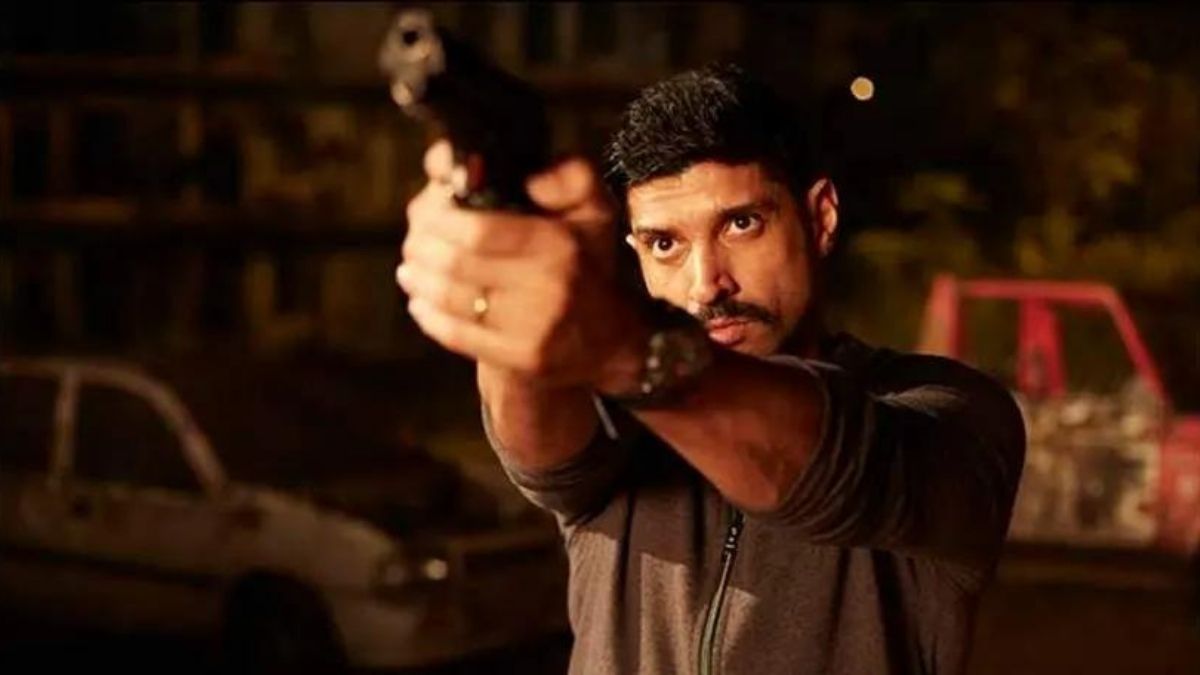
Some whacked out moves in close, interior Wazir-istan!
Wazir
Director: Bejoy Nambiar
Actors: Amitabh Bachchan, Farhan Akhtar
Rating: ***
I guess if you were to put together a montage of all scenes that feature Amitabh Bachchan drunk—happy drunk, sad drunk, dead drunk—over an indefatigable five decade plus film career, you might end up with a thoroughly watchable five-hour-plus video of its own.
Many, like me, who grew up on Bachchan’s films probably first learnt what it must be like to be hammered, watching him on screen. And then a drunken Bachchan shows up in this film. How can your lips not automatically stretch into a knowing smile? There is an instant sense of recognition—fine déjà vu. “Russia mein Russian girls ke saath vodka peene ka mazaa hi kuch aur hai.” “Aap Russia gaye hain?” “Nahin.”
Before him is a chessboard with all chess pieces placed inside shot glasses filled with vodka. The loser of each piece must down the shot. In this scene, while Bachchan plays it up in his inimitable ways, opposite him is Farhan Akhtar— almost his reverse, keeping it calm and low, although he’s fairly tipsy too.
Even filmmakers unperturbed by economics of star-driven movies maintain, great casting is often half their job done—it’s well begun all right. In that sense you are unlikely to come across a movie with a better yin-yang kinda lead cast that can so naturally play off each other—besides the fact that they are both hugely original actors with very distinctive voices (they can sing as well), and general on-screen personae.
Even besides the lead parts, you watch well known hero-types John Abraham, Neil Nitin Mukesh, actors like Prakash Belawadi, happy to pitch in merely for a scene or two, let alone Aditi Rao Hydari (as Farhan’s wife), who looks as ravishing as innately vulnerable (never mind that she rarely gets to do much in most of her films, this one included).
This film is mainly moody, dark, and brooding, although not ‘noir-ish’ at all. Every well-lit scene, perfectly framed, especially combat and crowd sequences, is executed with a strong sense of occasion—cut-to-cut, super tight. It’s advertising photography at its best. You can’t easily take your eyes off the movie. That’s already saying a lot.
The setting is Delhi. Bachchan plays a garrulous, invalid old chess master, who lost his limbs and wife to a car crash, home to terrorism in Kashmir, and his only daughter to an accident that for sure was a planned murder. Farhan’s a tough ATS (anti-terror squad) cop who lost his only child in a terror attack; it’s another matter that he’s partly to blame for it. He was chasing a dreaded terrorist with the kid in the backseat of his car.
Going back to the chessboard, why is that such a big deal? Well, the film’s story is meant to be a metaphor of sorts for advancing chess moves. The ‘badhshah’ or the king is a union minister (Manav Kaul)—the common target. Bachchan and Farhan’s characters are pieces from the other end. What unites them to be from the same front? The fact that they’ve both lost their little child (could that be analogy for ‘pyada’, or pawns destroyed? I don’t know). But the two main characters are certainly in the same position on the chessboard, so to say.
One can read further into the script. But there’s always the hazard of observing more than was intended! At any rate, the idea of viewing various characters, their positions, and moves through the prism of a game of chess is riveting enough.
Scrolls at the beginning and end of the film credit Vidhu Vinod Chopra for “original story,” “screenplay”, “editing” etc.—which is an odd number of credits to take for someone who’s already the film’s producer!
To be fair, I remember at least 12 years ago running news snippets about Chopra’s stunning chess-based script The Fifth Move—of him having possibly netted Hollywood heroes Dustin Hoffman, Paul Newman, Robin Williams for the lead role. He had reportedly said then, “The maturity level of the average (Indian) cinemagoer is very low. It is very difficult to make them understand such subjects.”
Whether he did whittle down the original script to appeal to a lay Indian filmgoer is hard to tell. And you do have some questions lurking in your head. That’s bound to happen when so little is known about the main characters (Bachchan’s in particular, outside of who he is, beyond the accidents). Maybe there is a lot more backstory in the writers’ minds than meets the viewers’ eyes. Or, how is it that (okaaay I will desist, spoilers were just about to follow!).
Basically with a three-character picture in a 10-people economy, with national politics run by four gents, all of them navigating a maze of chance and coincidence, there is always the risk of things appearing too gimmicky or contrived. Do they? Thoda sa. They do.
This is just so you keep your own expectations in check, mate. As for me, I was quite satisfied while making a move from the theatre. Yeah, this totally works, for the time it lasts! Can’t quite ask for more.
Mayank Shekhar’s new book Name Place Animal Thing (Stuff about India and pop-culture that make me go, ‘You’re kidding me!’) is up for pre-order online
